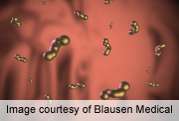Very low testosterone levels impact total lipid oxidation but have no effect on the production of very-low-density lipoprotein-triglycerides, according to a study published online Nov. 27 in Diabetes.
(HealthDay)—Very low testosterone levels impact total lipid oxidation but have no effect on the production of very-low-density lipoprotein-triglycerides (VLDL-TGs), according to a study published online Nov. 27 in Diabetes.
Christian Høst, from the Aarhus University Hospital in Denmark, and colleagues treated 12 healthy young males (mean age, 23.1 years) with a gonadotropin-releasing hormone agonist to induce castration levels of testosterone. Over several days one month later, the men were randomly treated with a gel containing physiological levels of testosterone, supraphysiological levels of testosterone, and placebo as part of a crossover study.
The researchers found that short-term hypogonadism had no effect on the secretion or concentration of VLDL-TGs but was characterized by reduced total lipid oxidation. High physiological testosterone levels increased VLDL-TG secretion under both basal conditions and after application of a hyperinsulinemic-euglycemic clamp.
"These data show that testosterone can act through fast non-genomic pathways in the liver," Høst and colleagues conclude. "Testosterone is not a major determinant of resting VLDL-TG kinetics in men."
The study was funded in part by an unconditional research grant from Ipsen Pharma. Two authors disclosed financial ties to the pharmaceutical industry.
More information:
Abstract
Full Text (subscription or payment may be required)
Journal information: Diabetes
Copyright © 2012 HealthDay. All rights reserved.


















